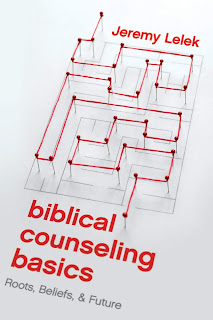Biblical Counseling
Basics: Roots, Beliefs, and Future by Jeremy
Lelek provides a comprehensive answer about what biblical counseling is. Lelek
does this by defining biblical counseling and then building on it in the three
sections of the book.
Lelek's
definition of biblical counseling includes the belief that it is a model of
care that brings scripture to bear on the struggles of the human soul, while
showing how people can flourish as they live in obedience to God.
In the
first section he provides a history of Christian soul care from the Garden of
Eden to the present day. Following this, in section two, he covers the
theological tenants of biblical counseling. These include the use of scripture
in counseling, God's role in the counseling process, a biblical understanding
of human nature, the process of change, the role of the church in biblical
counseling, and an overview of basic counseling methods. In the final section,
he explores areas within biblical counseling where the movement is still
developing and growing.
Biblical Counseling Basics does provide an excellent
explanation of the origins of counseling, showing that it began in the Garden
of Eden before the Fall, the beginning of restorative counseling after the
Fall, the provision of the law of Moses, and the content of the Old Testament.
He then shows how Jesus counseled, the counsel in the New Testament epistles,
and how soul care was practiced throughout (Western) church history. He
explains the development of the integration of psychology and scripture and the
origins and growth of the modern biblical counseling movement.
Lelek
also provides an excellent explanation of the authority, inspiration, and
inerrancy of scripture, and how these apply to counseling. He explains well how
this relates to human nature, human dysfunction, psychological healing, humankind's
purpose, and the nature of change.
His emphasis
on the importance of letting the Lord work on people's beliefs was helpful. In
particular, in relation to beliefs about God, the gospel, people, life history,
grace, the functional reality of sin, and its role in human motivations and
perceptions. His explanation of the importance of a renewed heart was also
insightful. He explains how the remnants of the old self may still affect
someone's beliefs, desires, and emotional responses.
As I
read the book, there were three areas that concerned me. First, Lelek misunderstands
the meaning of general revelation. In the book he understands this to be truths
which believers can glean from gifted non-Christian scholars (pages 64 and 195).
However, general revelation is the revelation of God himself to all people. It
is not truths that we can discover from others. Truth we discover from others
is common grace.
Second,
he claims that science has verified that chronic depression has a devastating
physiological impact in that it causes damage to the brain (page 156). Lelek
makes no mention of the brain being adaptive and can be changed when thoughts
and behavior change.
And
third, when referring to the servant of the LORD in Isaiah 49:4, he claims that
Jesus struggled with a sense of purposelessness, lamenting that his labors in
earth were for nothing (page 158). Lelek confuses which servant of the LORD is speaking
in this Messianic passage. Throughout scripture we read that Jesus was fully
aware of his purpose on earth. He who for the joy that was set before him
endured the cross, despising the shame, and is seated at the right hand of the
throne of God (Hebrews 12:2).
Biblical Counseling Basics: Roots,
Beliefs, and Future by
Jeremy Lelek provides a comprehensive answer about what biblical counseling is.
He does this by providing a definition of biblical counseling, explaining the
history of soul care from the Garden of Eden until the present day, covering
the theological tenants of biblical counseling, and discussing areas where the
movement is growing and maturing.


Comments
Post a Comment